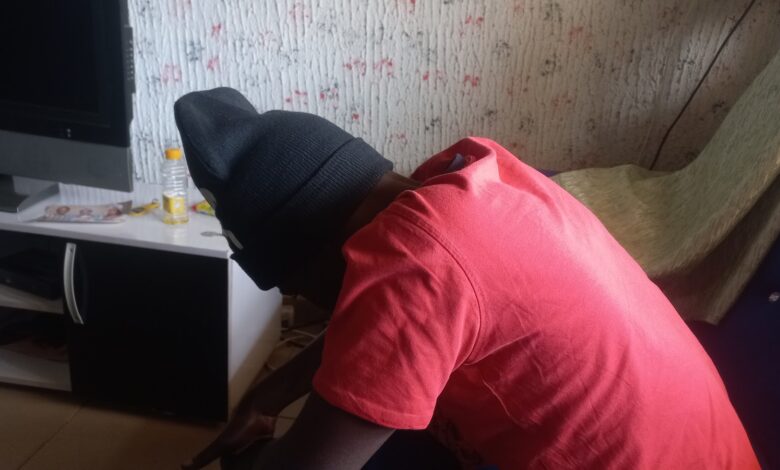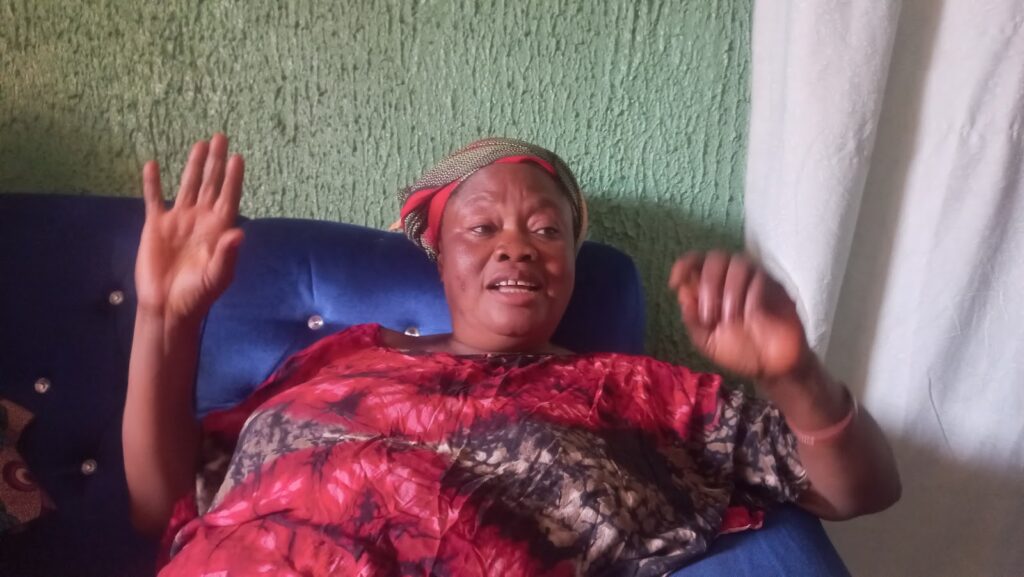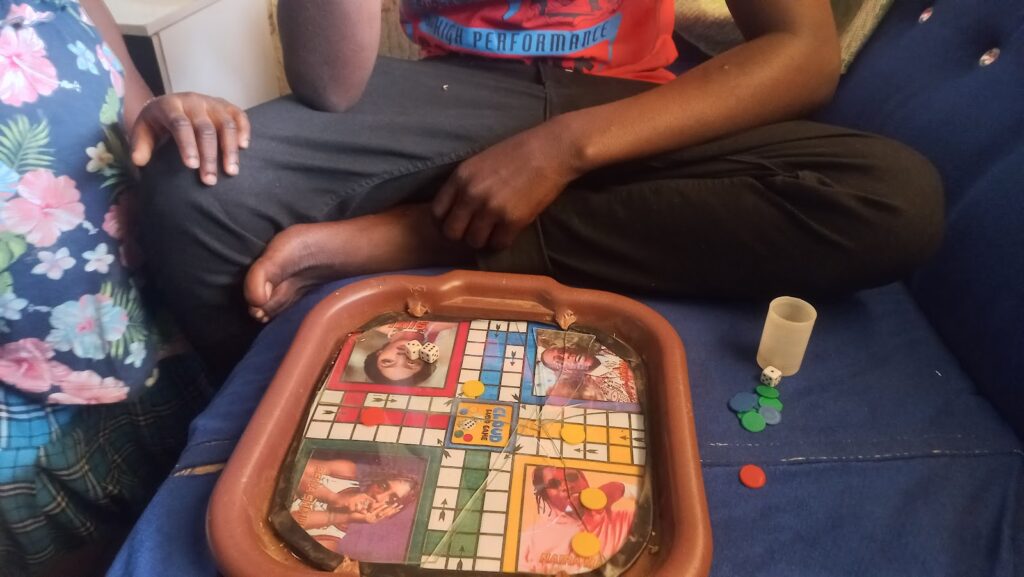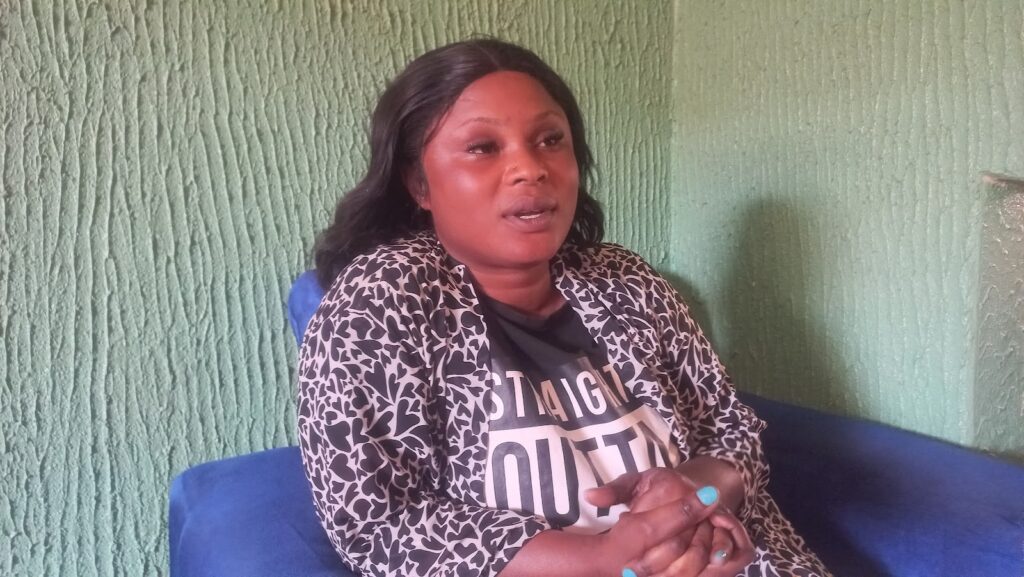Family Of Abducted Baptist Student Stigmatised Before His Return
Among the 121 students kidnapped in June 2021 from Bethel Baptist High School, Kaduna in Nigeria’s northwestern region, only 12-year-old Treasure Ayuba was held back. Now 14, he has escaped and made it home. We spoke to him and his family.

Mary Peter is a happy woman. Her grandson, Treasure Ayuba, had appeared, tired, at their front door on Nov. 2, after over two years in captivity. It was like a dream, she said.
“We were just sitting at about 7 p.m. when he returned,” Mary narrated from their home in Kaduna, northwestern Nigeria. “I was inside praying. My daughter, his aunt, was home at the time. Then I heard a knock. But before she [his aunt] reached the door, he opened the window. This is customary in our house when there is no response, we open the window from outside to see who is home. So she saw him, ran out, hugged him and came into the house with him.”
The entire family was shocked, Mary recalled. “She came into the room shouting, ‘Mama, Treasure is back!’ His mother, too, came out. We held each other and kept rejoicing.”
All the while, Treasure appeared extremely calm and quiet. Some of the family members rolled on the floor in excitement. “We asked each other if it was a dream because we had dreamt about his return times without number,” Mary told HumAngle. “Anyway, we did our drama while he sat on the floor, maybe because of fatigue due to the journey home.”
Then he uttered his first words: “I’m hungry.”

The family badgered him with questions. But Treasure said he did not know how he was able to make it home and simply said he had escaped.
Later, when Mary called up Rev. Joseph Hayab, chairman of the Kaduna State chapter of the Christian Association of Nigeria (CAN), Treasure would reveal some of what happened to him.
Set aside
On June 5, 2021, terrorists stormed Bethel Baptist High School located in the Chikun area of Kaduna. They left afterwards with 121 students. In the months that followed, all were released in batches, except one – a 12-year-old JSS One student, Treasure Ayuba.
Being the youngest among those abducted, the terrorists had given Treasure special treatment. At some point, they gave him mobile phones, but he could not call any family members because he did not remember their phone numbers. When they returned from operations, they gave him cash gifts. He also memorised routes whenever he was sent on errands by his captors. Mastering the routes and his possession of cash would aid his escape two years later. On D-day, when he got to a town he could not identify and heard a call for Kaduna passengers at a motor park, the trip cost him ₦6,000 (about $7).
“Contrary to speculations that the boy chose to live with the bandits, the true story is that his abductors decided that they would keep him as a reward to convert him to Islam, so that he could marry and raise Muslim children,” Rev. Hayab told The Cable, a Nigerian newspaper.
Mary explained to HumAngle that their social life ended with the abduction of her grandson. “It was difficult for us to go out and socialise in the neighbourhood because of the way people around treated us. There was gossiping and people saw us differently because of the rumour peddled around that Treasure did not want to return home.”
The family became an island in their community.
“If he did not want to return, he wouldn’t have come home by himself,” Mary pointed out, adding that it was propaganda by the kidnappers.
Twice beaten
Before Treasure, Mary’s family had their first terrible brush with terror when her granddaughter was kidnapped at the Federal College of Forestry Mechanisation Afaka, in Kaduna. The incident which took place on March 11, 2021, had made headlines. Thirty-nine students were kidnapped and the terrorists made videos of the victims pleading for ransom. It was just a couple of months away from the Baptist students’ abduction.
“The parents united so the kidnappers realised that they could not treat us differently,” Mary explained. “But in the case of Treasure, there was a lack of unity. I tried right from the beginning to ensure that I applied the experience I learned from the College of Forestry kidnapping. If I had succeeded, we wouldn’t have encountered the problems we had in the Baptist student’s case. When the kidnappers realised that they could cause disunity among us, they would tell one person one thing and say something different to another.”
She observed that the student who first revealed that Treasure did not want to return home did not really know her grandson. “Treasure was not up to four months in the school at the time and the other student was not up to five months. So, he did not know Treasure and Treasure also didn’t know him. He did not know Treasure’s voice.
“The audio that was played to us did not make sense because the moment I heard it, I said it wasn’t my grandson’s voice.”
At the time the students were kidnapped, Treasure did not know how to speak Hausa. So there was no way he could have learned to speak the language in such a short time. In addition to this, the Hausa accent was that of a Fulani.
When Treasure spoke to HumAngle, his response was in English only, and it was fluent.
During the telecommunications shutdown in Kaduna, effected to checkmate the activities of terrorists, Treasure’s family was able to speak with him once. “We heard his normal voice,” Mary insisted. But that is all now in the past, she added. Initially, the contact between the families and the terrorists who played the video was adamant that it was indeed her grandson.
“This was because he didn’t know Treasure personally. He didn’t agree back then when we had a discussion to resolve the matter. But after Treasure’s return, we all agreed that it was propaganda by those in the forest because they can use someone else to accomplish their mission.” Unfortunately, Mary said, the news had already travelled far.
“I want to beg the public, especially those with children, no one would want his or her child to become something bad. So, if we see such things, we should pray for the person instead of castigating them. We too were in pain, but instead of people to help pray with and for us, they said negative things,” she said.
“This boy was 12 years old. How can he refuse his parents and say he wants to stay in the forest? What kind of joy was he deriving from being held captive? Those who know him, know that he was plump. But look at how he looks now. A lot of money was given in the past and he was not released. But now he has returned by himself.”
Rev. Hayab revealed that ₦250 million (over $303,000) was paid to effect the release of the 121 victims from the terrorists. The students were released in batches, unfortunately without Treasure.
“Before then, I had taken my cry to Rev. Hayab, since everyone had forgotten about us. I took my cry to him and he gave us an ear. I had told him that the day our boy returned, I would hand him over to him and he would become his son,” Mary narrated.
“I thank him till today because when you are in pain, the person who becomes a shoulder to lean on should not be trivialised.”
At first, she had wondered about the wisdom of drawing public attention to Treasure since the criminals who perpetrated the act were still out there.
Now that he is home
Treasure has loved ones around him: his parents, a brother, a grandmother and an aunt. But it is clear that it would take time for him to heal. He enjoys playing Ludo and is excellent at it. Then he likes to help his grandmother with her fish pond just behind the house. “I’m going to throw in more fingerlings for him to keep busy so he doesn’t think too much,” Mary said.

But Treasure is quiet and frowns when his past is mentioned. He does not speak in anger but responds with one or two-word answers.
“He is the type of child who would not see you working and sit idle. He gives me joy. He is like the way he was, he hardly gives any cause for worry. He has always been my handbag,” Mary explained. “The only thing is that he does not like to be probed with questions about what happened to him in captivity.”
Now 14 years old, Treasure brightened up just a little when school was mentioned. “I am happy I am home. I want to go back to school,” he said.
His favourite subject is mathematics and someday he hopes to become a medical doctor.
Governor Uba Sani of Kaduna State said Treasure would be provided with psychosocial treatment to address the trauma he must have passed through at the hands of the terrorists. He also said machinery has been put in place to safeguard schools across the state.

Janet Peter, Treasure’s mother: “We never gave up hope that he would return.” Photo: Nathaniel Bivan/HumAngle
What about school?
Janet Peter, Treasure’s mother, is still rattled about her son’s sudden appearance. “We did not expect him to return when he did. When he saw how we were rejoicing, he was confused.
“I never gave up hope that he would return. Even after his return, he is still that good boy that I know. I really thank God. My wish is for him to go back to school. He is a very brilliant child. He will meet up.”
There are a variety of options open to Treasure as regards his education. One is a scholarship from Day Star Christian Academy. “But we are yet to decide where he will go,” Janet said.
At the time this report was filed, he was set to commence therapy sessions.
Support Our Journalism
There are millions of ordinary people affected by conflict in Africa whose stories are missing in the mainstream media. HumAngle is determined to tell those challenging and under-reported stories, hoping that the people impacted by these conflicts will find the safety and security they deserve.
To ensure that we continue to provide public service coverage, we have a small favour to ask you. We want you to be part of our journalistic endeavour by contributing a token to us.
Your donation will further promote a robust, free, and independent media.
Donate HereStay Closer To The Stories That Matter




